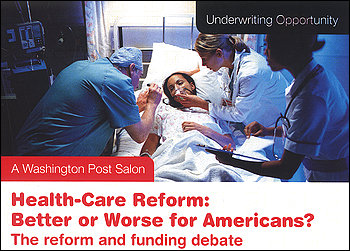Washington Post Publisher Cancels Planned Policy Dinners After Outcry
|
|
Friday, July 3, 2009
Washington Post Publisher Katharine Weymouth yesterday canceled plans for a series of policy dinners at her home after learning that marketing fliers offered corporate underwriters access to Post journalists, Obama administration officials and members of Congress in exchange for payments as high as $250,000.
"Absolutely, I'm disappointed," Weymouth said in an interview. "This should never have happened. The fliers got out and weren't vetted. They didn't represent at all what we were attempting to do. We're not going to do any dinners that would impugn the integrity of the newsroom."
The fliers were approved by a top Post marketing executive, Charles Pelton, who said it was "a big mistake" on his part and that he had done so "without vetting it with the newsroom." He said that Kaiser Permanente had orally agreed to pay $25,000 to sponsor a July 21 health-care dinner at Weymouth's Northwest Washington home, and that Rep. Jim Cooper (D-Tenn.) had agreed to be a guest. Pelton, who serves as general manager for conferences and events, said he had invited two-dozen business executives, advocates and presidential health adviser Nancy-Ann DeParle. But a White House spokeswoman said no senior administration officials had agreed to attend, and an aide to DeParle said she had received no such invitation.
Executive Editor Marcus Brauchli said he was "appalled" by the plan. "It suggests that access to Washington Post journalists was available for purchase," Brauchli said. The proposal "promises we would suspend our usual skeptical questioning because it appears to offer, in exchange for sponsorships, the good name of The Washington Post."
The Post Co. fliers offered an "intimate and exclusive Washington Post Salon, an off-the-record dinner and discussion at the home of CEO and Publisher Katharine Weymouth." The fliers, which said participants would be charged $25,000 to sponsor a single salon and $250,000 to underwrite an annual series of 11 sessions, were reported yesterday by Politico.
The full-color flier for the July 21 dinner said: "Bring your organization's CEO or executive director literally to the table. Interact with key Obama Administration and Congressional leaders . . . Spirited? Yes. Confrontational? No. The relaxed setting in the home of Katharine Weymouth assures it." The dinner, it said, would involve "health-care reporting and editorial staff members of The Washington Post . . . an exclusive opportunity to participate in the health-care reform debate among the select few who will actually get it done."
Weymouth, who had not seen the marketing copy, said that "we will never compromise our journalistic integrity." But she said other news organizations sponsor similar conferences and that she remains comfortable with the basic idea of lobbyists or corporations underwriting dinners with officials and journalists as long as those paying the fees have no control over the content.
But precisely what would be acceptable remains unclear. Asked whether the forums she envisions might still be viewed as buying access to Post journalists, Weymouth said, "I suppose you could spin it that way, but that is not the way it would have been done." She said the situation would be comparable to a company buying an ad in the newspaper while knowing that it "might hate the content" on that page.
Brauchli, who is listed on the flier as a host and discussion leader, had been involved in discussions with Weymouth and other executives stretching back to last year. He said he made clear to the company's marketing division that Post journalists would participate only if they could control the nature of any such conference. Brauchli said his conditions included multiple sponsors for an extended series of forums, rather than companies financing a single dinner involving their industry; a balanced lineup of participants from across the political spectrum; and no charge for the invited guests.
But even with those caveats, the off-the-record format would ensure that The Post could not report on the discussions, even as its name was being used to lure high-profile newsmakers.
"We expressed our concerns and are disappointed by this outcome," Brauchli said of the fliers, which were labeled "Underwriting Opportunity." "I would ascribe it to a lack of effective communication internally."
Even without the newsroom's participation, the aggressively worded pitch conveys the impression that The Post is offering special interests access to administration officials and lawmakers, raising a separate set of concerns about a dubious partnership with those covered by the newspaper. The Post often questions whether corporations, unions and trade associations receive access or favors in return for campaign contributions.



